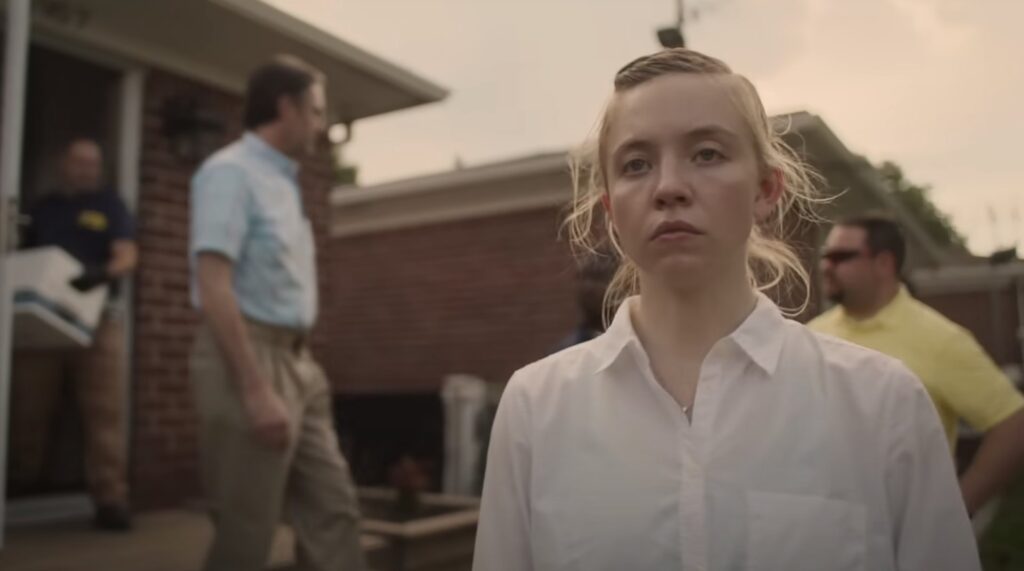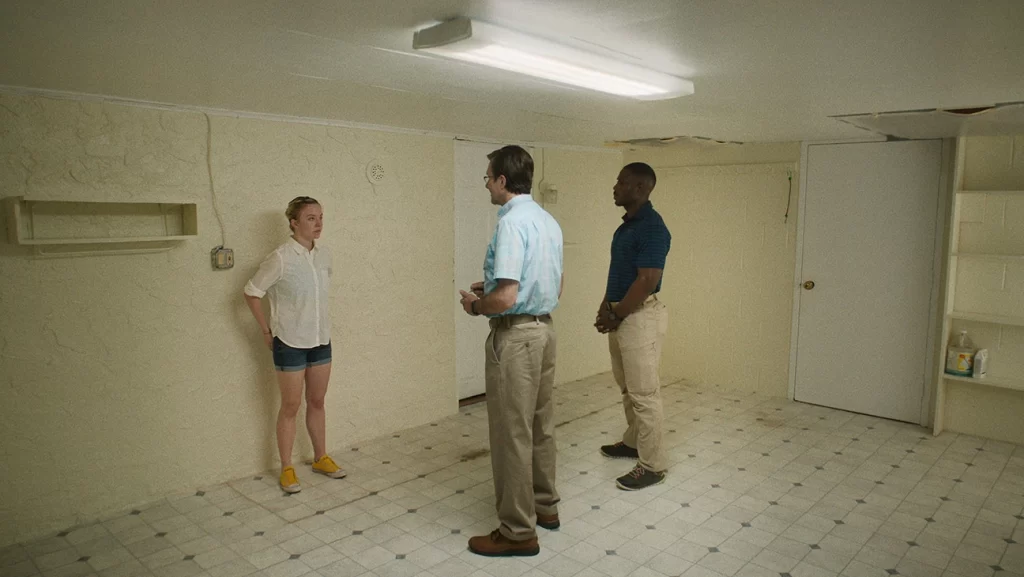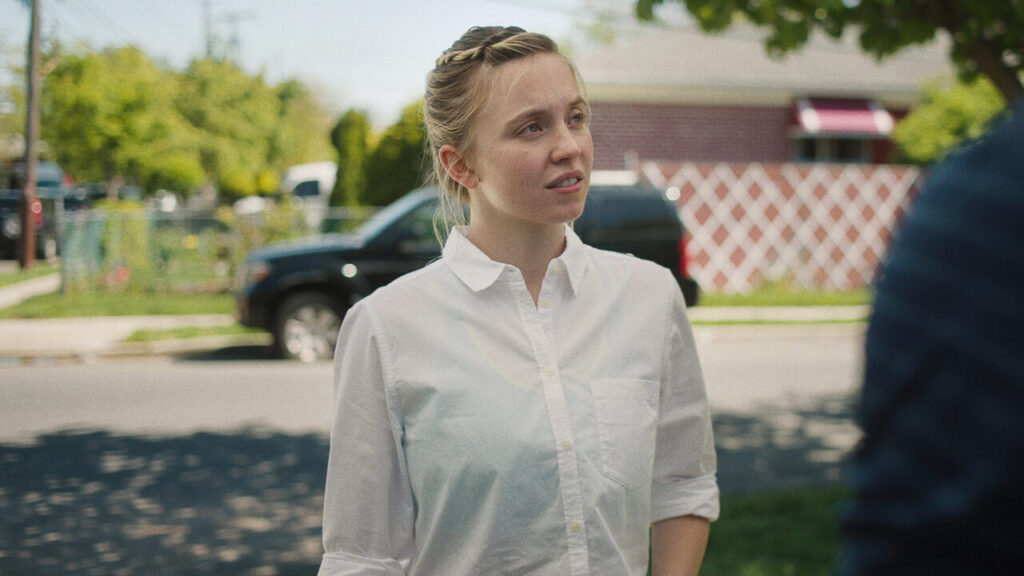
If television can have bottle episodes, can cinema have bottle movies? It probably isn’t worth the taxonomic trouble, given that TV critics routinely rant about how the term is misused. (Traditionally, “bottle episode” describes an installment that’s shot on a single set with no guest stars; it’s gained favor of late as a stylistic departure, but its primary motivation used to be financial rather than artistic.) Still, the minimalist concept—confined location, small cast—isn’t unique to television; plenty of feature films deploy a similar chamber-drama format, attempting to turn their modest mise-en-scène into showcases for narrative suspense and psychological complexity.
Last month saw the release of two such pictures—Reality, a fact-based docudrama about intelligence analyst Reality Winner, and Sanctuary, a two-hander about a sex worker and her wealthy client—both of which feature women trying to claim a measure of agency within a patriarchal structure. In one, the power dynamics are patently lopsided from the start; in the other, they’re the fulcrum of an ever-shifting battleground.

Of the two, Reality is somehow both more unusual and less ambitious. Aside from its brief bookends—the static opening shot displays Winner (played by Sydney Sweeney) working at her security cubicle, while the closing scenes provide the typical expository what-happened-after text—it takes place entirely on a sunny June afternoon, in and around Winner’s rented Georgia home. The spartan setup is hardly uncommon, but the movie’s gimmick is: Its dialogue purports to be a verbatim copy of the audio recording transcript from that afternoon, when two FBI agents interrogated Winner about her allegedly leaking classified information to the media.
This is a bold tactical gambit from writer-director Tina Satter, adapting the play she originally wrote in 2019. (Her co-screenwriter is James Paul Dallas.) The film’s title instantly acquires a double meaning, as its “ripped from the archives” premise is meant to imbue it with an additional layer of veracity. Satter reinforces this impression by supplying periodic shots of the transcript as though it’s being typed in real time, creating a curious chicken-egg effect (which came first, the recording or the movie?). She even underscores the document’s dictative rigor, showing us the halting patterns of everyday speech—the elliptical pauses, the dashed interruptions, the frequent “uhhs” and “umms”—and requiring her cast to mimic the awkwardness of real-life conversation.

The upshot of this approach is that, while Reality styles itself as a pressurized thriller—what did she do? what will happen to her?—it (ahem) really operates as a dramaturgical exercise. It nominally traffics in clammy tension—much of its second half involves two men looming over an imprisoned woman, systematically demolishing her verbal defenses—but it also devotes a healthy (or, depending on your perspective, unhealthy) percentage of its runtime to logistical banalities that have nothing to do with Winner’s exploits. When the two feds, whose names are Garrick (Josh Hamilton) and Taylor (Marchánt Davis), first confront Winner, they spend several minutes discussing how they can enter her house without being attacked by her dog. (“She doesn’t like men,” she tells them.) Later, while other unnamed agents are rifling through Winner’s belongings, the interrogators engage her in some friendly outdoor chatter about her CrossFit prowess. The movie’s most kinetic scene features Winner sprinting toward an open door—not to escape, but to prevent her cat from bolting into the street.
This isn’t exactly exciting stuff, and Satter’s self-imposed challenge—which she largely rises to with aplomb—is to invest these ostensible pleasantries with a frisson of menace. In doing so, she places great responsibility on (and faith in) her actors: Sweeney foregrounds Winner’s wholesomeness even as she gradually reveals whispers of desperation and panic, while Davis and especially Hamilton convey the casual prerogatives of police power. Together, Satter and her cast cultivate a precipitous tone in which surface politeness mingles with subliminal hostility. There is something oddly chilling about Garrick repeatedly asking Winner if her dog needs water, or his constant deferrals to her putative comfort. “We can talk inside, outside, wherever’s good for you,” he says, while plainly implying that absolutely nowhere is good for her. (Viewers who possess a certain worldview—and a specific taste in television—may find themselves shouting at the screen, “Get a lawyer!”)

Paradoxically, Reality is more compelling when Winner is less cornered. Once the action transitions to an unadorned basement, where Garrick and Taylor press their suspect with increasing conviction, the limitations of the screenplay’s conceit become more apparent. Satter isn’t out of tricks—her most visible flourish is to articulate redactions in the transcript not with bleeps, but with sudden visual removals of the speaker, as though uttering a magic word has made them blink out of existence—but the sad story of Winner’s fate is too inevitable to gather much intrigue or momentum.
Nevertheless, Reality remains interesting, largely for how it stays within its dialectically prescribed boundaries yet still develops such a forcible point of view. Strip away the final sequence (plus an offhand reference to Fox News), and you can theoretically read it as a police procedural, with Garrick and Taylor as the starring detectives and Winner as their cagey target; after all, they don’t seem like bad guys, and they’re faithfully executing their sworn duties while interviewing a suspected criminal. But Satter’s blocking and editing renders such an interpretation all but impossible. Instead, the movie is a hand grenade lobbed at bureaucratic incompetence and political malfeasance, with Winner—who attempted to shine a light on Russian hacking of American elections—as its undisputed hero. This may not be to everyone’s taste, but Satter isn’t concerned with appealing to both sides; she aims to startle and provoke. Structurally speaking, Reality may be a work of cinematic artifice. But its anger is for real.

A different sort of provocation lies at the heart of Sanctuary, Zachary Wigon’s sly and kinky new thriller. In the literal sense, it’s an even smaller movie than Reality: There are only two characters, and the action transpires almost exclusively inside a handsomely appointed hotel suite, with only a few trips to a nearby elevator breaking up the claustrophobia. But because Sanctuary is a work of pure fiction (the screenwriter is Micah Bloomberg), it hums with an exploratory freedom that the cribbed and cramped Reality can’t partake in. It may never leave the room, but it still goes places.
The movie’s opening scenes could work well as a twisty short film. Hal (Christopher Abbott), the scion of a lucrative business empire, has summoned a corporate lawyer named Rebecca (Margaret Qualley) to his room for some number-crunching due diligence. With her dark-green pantsuit and crisply lettered stationery, Rebecca is the very picture of clipped professionalism, but there is something oddly pointed about her questions of Hal—a directness that verges on antagonism. We soon learn that this is by mutual design: Rebecca is a gifted dominatrix, and her aggressive derision is a scripted performance that taps directly into Hal’s sadomasochistic pleasure centers.

Or does it? “This isn’t what I wanted,” Hal sulks at one point, and while that line proves to be yet another pantomime—a planned step up (or down?) within the principals’ thorny, multi-level construction—it becomes fair to wonder if he’s received more than he’s bargained for. Of course, giving men what they deserve is basically Rebecca’s calling card, and if she goes the extra mile, that’s just reflective of her particular talents—talents that Hal is arguably derelict in appreciating.
Sanctuary, then, is a movie about a perpetual power struggle. Despite its early feints, it’s fairly straightforward in terms of plot; this isn’t one of those nested mindfucks in which we’re constantly wondering whether what we’re watching is real or part of a game. Instead, the true questions it poses revolve around influence and control. Who’s really the dominant here? Is Rebecca actually a commanding presence, or is she just fulfilling the role that Hal has assigned to her? Is their relationship purely transactional, or have glimmers of genuine feeling infiltrated their arrangement? And did Rebecca really hide a camera somewhere in the suite to capture embarrassing footage, or is her threat of blackmail just another elaborate subterfuge?
The last of those unknowns allows Wigon to draw out his game of cat and mouse (but which is which?), even though the circumscribed material isn’t necessarily suited for feature length. It’s difficult for Sanctuary to maintain its level of feverish intensity for its entire runtime, and there are moments when the film’s narrow scope feels engineered rather than authentic. But even if the movie can’t fully evade the sensation that it’s foremost a work of creative architecture, it’s still damn entertaining—not just for the swerves in its story, but for the intricacies of its performances.

“You are very good at what you do,” Hal concedes to Rebecca in the midst of one of her more imaginative displays of dominance. (In related news, watching this movie will forever alter how you hear the Pledge of Allegiance.) He’s not wrong, but the brilliance of Qualley’s portrayal is that she calibrates Rebecca’s volcanic supremacy, allowing fissures of weakness and doubt to peek through the façade of omnipotence. Abbott, in turn, parries her fury with a combustible mix of self-loathing and self-absorption; sure, Hal is diffident and subservient, but he’s also entitled and condescending. The actors feed off each other, creating a perverse alchemy of attraction and repulsion. As Rebecca says: “It takes two.”
In its final act, without betraying the tautness of its conceit, Sanctuary takes some reckless leaps into the metaphorical abyss, with one last round of role-play in which Rebecca embodies her part so deeply that she acquires otherworldly force. In terms of credibility (both narrative and emotional), it’s dubious, but that’s the wrong way of looking at it; it’s better to view the movie as a fantasy of feminine conquest and toppled hierarchies. And so, if the tragedy of Reality is its heroine’s subjugation at the hands of male power, the thrill of Sanctuary winds up being your own surrender. In the face of such unbridled audacity, you have no choice but to submit.
Grades
Reality: B
Sanctuary: B+
Jeremy Beck is the editor-in-chief of MovieManifesto. He watches more movies and television than he probably should.
